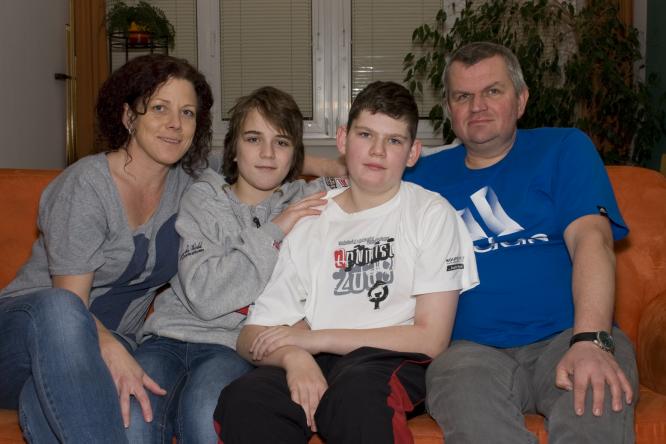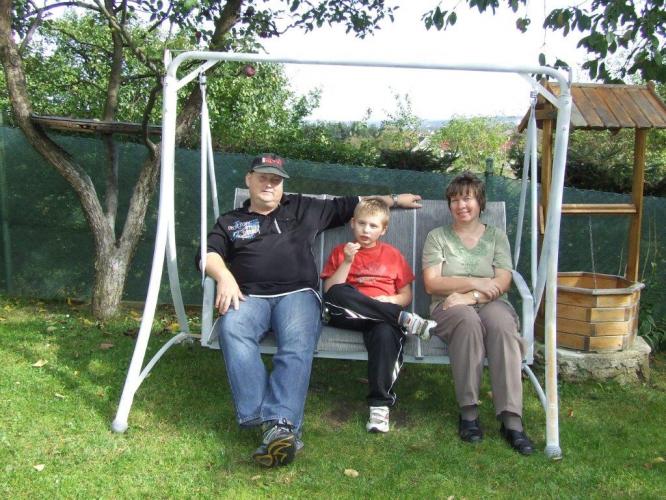Czech Supreme Court enforces legal right for children with disabilities to live in the community
 Štěpán Welser, 17, and his family. (c) MDAC.
Štěpán Welser, 17, and his family. (c) MDAC.
In the first judgment of its kind in central Europe, the Czech Supreme Administrative Court has acknowledged that children with disabilities have an enforceable right to receive social services to ensure that they can continue living in the community. In doing so, the court expressly relied on Article 19 of the UN Convention on the Rights of Persons with Disabilities (CRPD).
We need your contributions to help more children stay with their families.
Please support our Christmas Appeal.
Faced with the likelihood of having their children placed into institutions, the parents turned to MDAC to fight for supports to keep their families together. David, Štěpán and Miroslav are three boys with autism, intellectual disabilities and behavioural issues. All three boys live with their parents and families near České Budějovice, in the south of the country. As they were getting older, their loving families found it increasingly challenging to support them to live at home, and were fearful that, without support, the only option for their children would be placement in an institution.
Unwilling to give up, the parents turned to a local provider of specialist social services in České Budějovice. The organisation could offer only limited help but wanted to build a small specialist centre to provide individualised services close to the children’s homes. The organisation requested financial assistance from the regional authority to provide this.
The regional authority refused to recognise their obligation to ensure that the children could continue living with their families. Although there were finances available, they instead chose to invest money in rebuilding a pavilion for the children at a large residential institution in Osek. The institution is a former castle in a rural area warehousing 140 people with disabilities. Moving the children there would take them more than 100kms away from their homes and families. The reasons were simple and bewildering at the same time: the authority wanted to ensure enough people were kept at the institution so that it could continue receiving State funding. They argued that it was cheaper than keeping the children at home.
The families contacted the Czech Public Defender of Rights, who put them in touch with Maroš Matiaško, human rights lawyer and MDAC legal monitor. Despite negotiations, the regional authorities were unwilling to back down. Very quickly, Mr. Matiaško and the families agreed on the bold move of litigating the rights of David, Štěpán and Miroslav to live in the community.
The case initially failed: the regional court dismissed the claim saying that no one had a legal right to receive social services.
“We were surprised.” said Maroš. “The reasoning of the court was very poor, completely denying the enforceability of the social rights of these children and their right to live independently in the community. The logical next step was to submit a complaint to the Supreme Administrative Court, arguing a violation of the right to live independently under Article 19 CRPD.”
The Czech Republic voluntarily ratified the CRPD in 2009, thereby accepting a binding obligation under international law to ensure that all persons with disabilities are supported to live in the community, including children. Despite this commitment, the country has shown slow progress, and still has one of the highest rates of disability-based institutionalisation in Europe.
 Miroslav Zalesak, 12, with his parents. (c) MDAC.
Miroslav Zalesak, 12, with his parents. (c) MDAC.
The Public Defender of Rights has criticised this bias towards institutionalisation. Marie Lukasová, head of the monitoring department at the office of the Public Defender of Rights, explained:
“The Public Defender of Rights addresses Czech authorities quite often with recommendations based on Article 19 of the CRPD. The Defender is entitled to deal with complaints about public guardianship and also conducts inquiries on his own initiative, based on, for example, his findings as the national preventive mechanism. People in need of support or care are excessively placed into institutions, despite a number of policies which recommend the opposite.”
Potential to help thousands
The case was successful at the Supreme Administrative Court, which quashed the decision of the lower court. It found that the regional authority and the lower court had taken the wrong approach, and had failed to take account of their obligations under international law. The Court recognised that persons with disabilities and their families can enforce their right to social services before the general courts and judges are obliged to comply with the right to independent living enshrined in international law.
The judgment has the potential to help thousands of people with disabilities in the Czech Republic avoid institutionalisation and gain supports to enable them to live independently. The Supreme Court also found that Czech law must be interpreted in line with the European Social Charter and the general comments of the UN Committee on Economic, Social and Cultural Rights. The Court stated:
“When the Czech Republic signed and ratified this international convention [CRPD], it was also obliged to adhere to it (Article 1, Paragraph 2 of the Constitution of the Czech Republic) and the effective fulfilment of this convention is an obligation of authorities of the legislative, executive and judiciary.
According to Article 10 of the Constitution of the Czech Republic, promulgated and ratified international agreements which have been approved by the Parliament are binding upon the Czech Republic, and shall constitute a part of the legal order; should an international agreement contradict a domestic legal provision, the international agreement shall be applied.
The above mentioned convention [CRPD] meets all of these requirements for sure. Therefore it is necessary to take into account the provision of the UN Convention on the Rights of Persons with Disabilities when identifying the concrete content of the social right claimed by the applicants, since it must be considered as a law which is executing this social right … The same applies for … the European Social Charter. … Other documents claimed by applicants that are considered as international soft-law must be also taken into account, particularly the General Comment of the UN Committee on Economic, Social and Cultural Rights.”
The reasoning of the Supreme Administrative Court relies on an understanding that social rights are justiciable and can be enforced by courts as a matter of law.
“The decision is a great step forward as it establishes that what was so far vague request, should be now considered as legitimate legal claim”, said Marie Lukasová who warmly welcomed the decision.
“The regional court is now obliged to carefully assess whether the decision of the local authority to invest in Osek is discriminatory, violates a minimum core of the right, and whether it is rational. The judge should take into account a certain margin of appreciation of the authorities, however I believe that because a restriction of the right would apply to a particularly vulnerable group in society, who have suffered considerable discrimination in the past, that margin of appreciation is substantially narrower and there must be very weighty reasons for any restrictions”, said Maroš.
MDAC’s international My Home, My Choice campaign aims to challenge the institutionalisation of people with mental disabilities globally. It calls for governments to end the funding of institutions, and instead develop individualised and community-based supports, in line with the requirements of the UN Convention on the Rights of Persons with Disbailities. Information and strategies for litigating these issues can be found in MDACs publication “Litigating the right to community living for people with mental disabilities: A handbook for lawyers”.
Read more:
- My Home, My Choice in the Czech Republic: The Right to Community Living for People with Mental Disabilities in 2014 - click here
- Litigating the right to community living for people with mental disabilities: A handbook for lawyers - click here
Help us help more children stay with their families, and get a proper education
Please give to our Christmas appeal if you can
Thank you.

